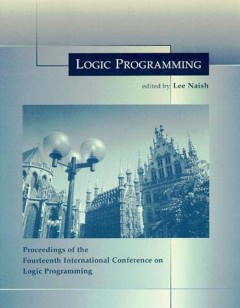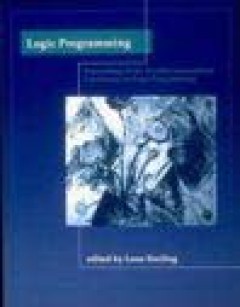Filter by

Why America Is Not a New Rome
An investigation of the America-Rome analogy that goes deeper than the facile comparisons made on talk shows and in glossy magazine articles.America's post-Cold War strategic dominance and its pre-recession affluence inspired pundits to make celebratory comparisons to ancient Rome at its most powerful. Now, with America no longer perceived as invulnerable, engaged in protracted fighting in Iraq…
- Edition
- -
- ISBN/ISSN
- 9780262283885
- Collation
- -
- Series Title
- -
- Call Number
- -

Logic Programming: The 14th International Conference
"The International Conference on Logic Programming is the main annual conference sponsored by the Association for Logic Programming. It covers the latest research in areas such as theoretical foundations, constraints, concurrency and parallelism, deductive databases, language design and implementation nonmonotonic reasoning, and logic programming and the Internet."--BOOK JACKET.
- Edition
- 1
- ISBN/ISSN
- 9780262291354
- Collation
- -
- Series Title
- -
- Call Number
- -

Ivory Bridges: Connecting Science and Society
A study of two bridges between science and society: governmental science policy and scientists' voluntary public-interest associations. According to a widespread stereotype, scientists occupy an ivory tower, isolated from other parts of society. To some extent this is true, and the resulting freedom to pursue curiosity-driven research has made possible extraordinary scientific advances. The spi…
- Edition
- 1
- ISBN/ISSN
- 9780262284073
- Collation
- -
- Series Title
- -
- Call Number
- -

"Jesuit Science and the Republic of Letters "
A reassessment of the Jesuit contributions to the emergence of the scientific worldview.Founded in 1540, the Society of Jesus was viewed for centuries as an impediment to the development of modern science. The Jesuit educational system was deemed conservative and antithetical to creative thought, while the Order and its members were blamed by Galileo, Descartes, and their disciples for virtuall…
- Edition
- 1
- ISBN/ISSN
- 9780262272537
- Collation
- -
- Series Title
- -
- Call Number
- -

Journey from Cognition to Brain to Gene: Perspectives from Williams Syndrome
A blueprint for the investigation of neurodevelopmental disorders, this book presents the work of a team of scientists using a multidisciplinary, integrated approach to link genes with human behavior. Using Williams syndrome as a model, leading researchers in neuroanatomy, neurocognition, neurophysiology, and molecular genetics have built bridges between disciplines to link higher cognitive fun…
- Edition
- 1
- ISBN/ISSN
- 9780262287395
- Collation
- -
- Series Title
- -
- Call Number
- -

The Kantian Legacy in Nineteenth-Century Science The Kantian Legacy in Ninet…
"Historians of philosophy, science, and mathematics explore the influence of Kant's philosophy on the evolution of modern scientific thought."--Jacket.
- Edition
- 1
- ISBN/ISSN
- 9780262273268
- Collation
- -
- Series Title
- -
- Call Number
- -

Knowledge and Mind: A Philosophical Introduction
This is the only contemporary text to cover both epistemology and philosophy of mind at an introductory level. It also serves as a general introduction to philosophy: it discusses the nature and methods of philosophy as well as basic logical tools of the trade. The book is divided into three parts. The first focuses on knowledge, in particular, skepticism and knowledge of the external world, an…
- Edition
- 1
- ISBN/ISSN
- 9780262269315
- Collation
- -
- Series Title
- -
- Call Number
- -

"Knowledge-Based Neurocomputing "
Looking at ways to encode prior knowledge and to extract, refine, and revise knowledge within a neurocomputing system.Neurocomputing methods are loosely based on a model of the brain as a network of simple interconnected processing elements corresponding to neurons. These methods derive their power from the collective processing of artificial neurons, the chief advantage being that such systems…
- Edition
- 1
- ISBN/ISSN
- 9780262270496
- Collation
- -
- Series Title
- -
- Call Number
- -

Knowledge in Action: Logical Foundations for Specifying and Implementing Dyna…
Modeling and implementing dynamical systems is a central problem in artificial intelligence, robotics, software agents, simulation, decision and control theory, and many other disciplines. In recent years, a new approach to representing such systems, grounded in mathematical logic, has been developed within the AI knowledge-representation community. This book presents a comprehensive treatment …
- Edition
- 1
- ISBN/ISSN
- 9780262282314
- Collation
- -
- Series Title
- -
- Call Number
- -

Logic Programming: The 12th International Conference
"13-16 June 1995, Tokyo, Japan ICLP, which is sponsored by the Association for Logic Programming, is one of two major annual international conferences reporting recent research results in logic programming. Logic programming originates from the discovery that a subset of predicate logic could be given a procedural interpretation which was first embodied in the programming language, Prolog. The …
- Edition
- 1
- ISBN/ISSN
- 9780262291439
- Collation
- -
- Series Title
- -
- Call Number
- -
 Computer Science, Information & General Works
Computer Science, Information & General Works  Philosophy & Psychology
Philosophy & Psychology  Religion
Religion  Social Sciences
Social Sciences  Language
Language  Pure Science
Pure Science  Applied Sciences
Applied Sciences  Art & Recreation
Art & Recreation  Literature
Literature  History & Geography
History & Geography